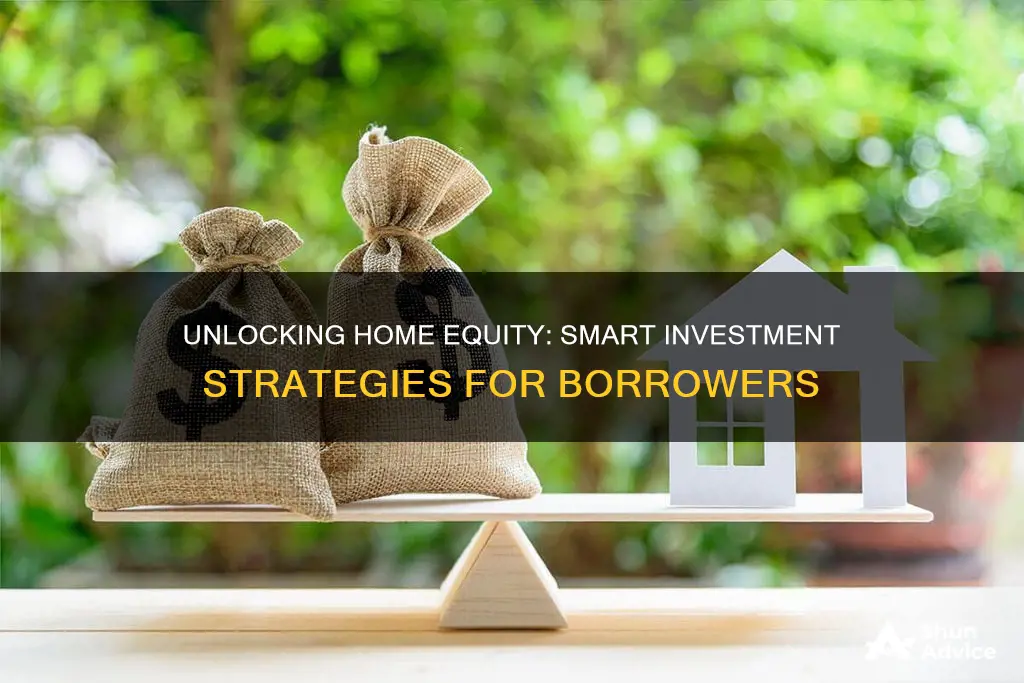
Home equity loans are a way to borrow money against the value of your home. They can be used to invest in real estate, stocks, bonds, or mutual funds. When you take out a home equity loan, you are essentially using your home as collateral, so it's important to carefully consider any investment you plan to finance with home equity. There are several ways to tap into your home equity, including home equity loans, home equity lines of credit (HELOC), and cash-out refinancing. Each option has its own advantages and disadvantages, so it's important to do your research and understand the risks involved before making a decision.
| Characteristics | Values |
|---|---|
| What is a home equity loan? | A type of second mortgage that allows you to borrow against the equity in your home. |
| How to calculate home equity | Current market value of your home minus the balance remaining on your mortgage. |
| Advantages | Increased liquidity, lower interest rates compared to other loans, lower fees and closing costs. |
| Disadvantages | Trading an asset (your home) for debt, vulnerable to shifts in the housing market, could have three mortgages for two homes, interest payments may not be tax-deductible. |
| Alternative methods | Hard money loans, seller financing, peer-to-peer lending, self-directed IRAs. |
| How to use home equity | Finance investments, including investment properties, stocks, bonds, mutual funds, home improvements, starting a business, debt consolidation, etc. |
What You'll Learn

Lump-sum home equity loan
A home equity loan is a consumer loan that allows homeowners to borrow a lump sum of money against the value of their home. The amount of money that can be borrowed is based on the equity the homeowner has in their property. Equity is calculated by subtracting the amount owed on the mortgage from the current market value of the property. For example, if a home is worth $500,000 and the homeowner owes $300,000 on their mortgage, they have $200,000 in equity.
Home equity loans typically have fixed interest rates and fixed monthly payments, and the borrower receives the entire loan amount upfront. It's important to remember that the home is used as collateral for the loan, so if the borrower defaults on the loan, they could lose their home.
Home equity loans can be used for various purposes, including investing in real estate, starting a business, making home improvements, or paying off debt. When using a home equity loan for investing, it's important to carefully consider the risks involved. The housing market can be unpredictable, and there is always the potential for the value of an investment property to decrease.
Before taking out a home equity loan, it's recommended to seek independent financial advice and thoroughly research the associated risks and costs. It's also important to compare interest rates and products to get the best deal. Additionally, a financial advisor can provide guidance on potential investment options and help determine if a home equity loan is the right choice for an individual's financial goals.
State Investment Fuels China and India's Rapid Growth
You may want to see also

Home equity line of credit (HELOC)
A home equity line of credit (HELOC) is a type of loan that allows you to borrow against the equity in your home. HELOCs are "open-end" lines of credit, meaning you can borrow money repeatedly up to a pre-approved credit limit. This credit limit is typically 80-85% of the value of your home, minus the amount you still owe on your mortgage.
HELOCs usually have a draw period of around 10 years, during which you can borrow money as needed. You will only pay interest on the amount you borrow, and you can make payments during this period if you wish. After the draw period ends, you will enter the repayment period, where you will repay the full balance over 10-20 years.
HELOCs usually have variable interest rates, which means your payments may change from month to month. However, some lenders offer the option to convert some or all of your balance to a fixed interest rate, which can provide more predictability.
To qualify for a HELOC, you will need to meet certain requirements, including having sufficient equity in your home and a good credit score. Lenders will also consider factors such as your credit history, employment history, income, and monthly debts.
HELOCs can be a great option for financing large expenses or consolidating higher-interest debt. However, it is important to remember that your home serves as collateral for the loan, so failing to keep up with the payments could result in losing your home.
Equity Investment: Strategies for Finding the Right Investors
You may want to see also

Cash-out refinance
A cash-out refinance is a way to access cash by replacing your current mortgage with a new, larger loan. It allows you to convert your home equity into cash.
Here's how it works:
- You take out a new mortgage for more than your previous mortgage balance.
- The funds are used to pay off the old loan.
- The remainder is paid to you in cash.
For example, let's say you bought a home worth $500,000 with a 20% down payment and a monthly payment of $1,796.18. After five years, your loan balance is $358,788 and your home is worth $575,000. You decide to make $50,000 worth of improvements to the home. With a cash-out refinance, you could get a new loan with a balance of $320,000 ($250,000 mortgage balance + $70,000 cash).
The benefits of a cash-out refinance include:
- Access to a large amount of cash at a relatively low-interest rate.
- The ability to consolidate debt and save on interest payments.
- The potential to increase your home's value through renovations.
- Possible tax benefits, such as deducting the interest paid on the cash portion from your income tax.
However, there are also some drawbacks to consider:
- Your monthly payment and mortgage loan balance will increase.
- You may face higher closing costs, fees, or interest rates compared to a standard refinance.
- There is a risk of losing your home if you can't keep up with the higher payments.
Before pursuing a cash-out refinance, it's important to weigh the pros and cons and ensure that you can afford the higher monthly payments.
Equity Investment Management: Understanding the Basics
You may want to see also

Risks of using a home equity loan
Home equity loans allow you to borrow a large sum of money by leveraging the equity in your home. However, there are several risks associated with this type of loan that you should be aware of before signing up. Here are some detailed paragraphs on the risks of using a home equity loan:
Risk of Losing Your Home
The most significant risk of taking out a home equity loan is the possibility of losing your home. Since a home equity loan uses your home as collateral, failing to keep up with loan payments could result in foreclosure. This means the lender could seize your home, displacing you and any other occupants. Foreclosure also causes long-lasting harm to your credit score, making it more difficult to secure future loans or financing.
Impact on Credit Score
Even if you are diligent with your loan repayments, simply taking out a home equity loan can affect your credit score. This is because your credit score takes into account how much of your available credit you are using. A large home equity loan can negatively impact your score by increasing the amount of credit you have utilised. Consequently, you may find it harder to qualify for other loans in the immediate future.
Fluctuating Property Values
Another risk to consider is the potential change in your home's value over time. If you tap into your home equity and property values subsequently fall, you could end up with very little equity or even owe more than your home is worth, a situation known as negative equity or being underwater. This scenario would impede your ability to sell your home or refinance your mortgage. During the 2007-2008 financial crisis, millions of homeowners found themselves in this unfortunate position.
Interest Rate Risks
Home equity loans typically have fixed interest rates, providing stability and consistency with monthly payments. However, if you opt for a home equity line of credit (HELOC), interest rates are usually variable. This means your monthly payments can increase if interest rates rise, making them unaffordable. With a HELOC, you also have the option to make interest-only payments during the draw period, but this could lead to a payment shock once the principal balance is added to your bill.
Increased Debt Burden
Taking out a home equity loan increases your debt burden and reduces your ownership stake in your home. As your debt levels rise, your debt-to-income ratio (DTI) also increases, impacting your creditworthiness. A higher DTI makes it more difficult to qualify for new loans or credit cards or secure the best interest rates.
Planning Savings and Investments: Strategies for Financial Freedom
You may want to see also

Alternative ways to finance
There are several alternative ways to finance your home other than taking out a home equity loan. Here are some options:
Cash-Out Refinance
A cash-out refinance allows you to replace your current home loan with a new mortgage for a higher amount. The difference between the new loan and what you currently owe is paid out in cash, which you can use for a down payment on a new property or other investments. This option may provide a lower interest rate than a home equity loan, but it also resets your primary mortgage term and may result in higher closing costs.
Personal Loan
Personal loans are often unsecured and can be a faster and simpler alternative to a home equity loan. They don't require your home as collateral, but the loan amounts may be lower, and interest rates are typically higher. Personal loans usually have shorter repayment terms, ranging from one to seven years.
K) Loan
A 401(k) loan allows you to borrow from your retirement savings without a credit check. This option can provide quick funding without risking your home, but it reduces your retirement savings and potential growth. Additionally, if you leave your job, the loan must be repaid in full.
Bridge Loan
A bridge loan is a short-term financing option, usually lasting no more than a year. It is designed to help you buy a new home before selling your current one. Bridge loans often have faster approval times than home equity loans but come with higher interest rates and fees. You risk paying two mortgages if your current home doesn't sell quickly.
Home Equity Investment
A home equity investment provides cash in exchange for a share of your home's future appreciation. This option typically has no monthly payments or interest, but it can be more expensive in the long term if your home value increases significantly. It also reduces your profit when you sell your home.
Home Equity Conversion Mortgage (Reverse Mortgage)
A reverse mortgage is available only to seniors aged 62 and above. It does not require monthly payments, but it becomes due when you move out or pass away. Reverse mortgages can reduce the inheritance left for heirs and may be more expensive in the long term.
Personal Line of Credit
A personal line of credit offers similar flexibility to a HELOC but typically comes with higher interest rates and lower borrowing limits. It provides rolling access to funds without requiring home equity as collateral.
Credit Card
Credit cards provide instant access to funds and can be used for small, short-term expenses. However, they often come with high-interest rates, and it's important to manage your balance carefully to avoid long-term debt.
Rent-Back Agreement
With a rent-back agreement, you sell your home to an investor or company and then rent it back, usually for one to five years. This option allows you to access your home's full equity without debt, but you lose ownership and the potential for future appreciation.
Savings vs Investments: What's the Real Difference?
You may want to see also
Frequently asked questions
Most lenders allow you to borrow up to 80% of your combined loan-to-value (CLTV) ratio. This is calculated by taking the total amount you would owe in home-based debt and dividing it by the total value of the home.
A home equity loan is a type of second mortgage where you receive a lump sum upfront and make regular monthly repayments, usually at a fixed interest rate. A HELOC is a revolving line of credit, much like a credit card, that comes with a variable rate. You can borrow, repay, and borrow again as needed during a set draw period and then pay off your balance during a repayment period.
Using a home equity loan to invest in real estate carries the risk of losing your home if you can't keep up with payments. Additionally, the value of your home could decrease, leaving you "underwater" on your loans.
You can only get a tax deduction on the interest portion of your home equity loan if it is used to buy, build, or substantially improve the borrower's home. If you're using the loan to invest in a separate property, you cannot get a tax deduction.







